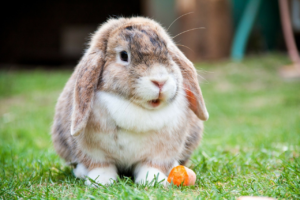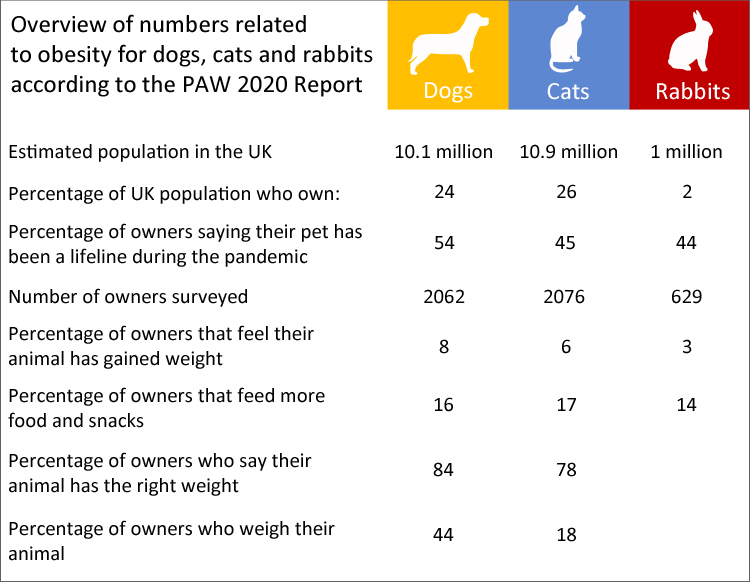Introduction
Never have pets been more important in our lives than during the current pandemic. In a time when we are allowed very limited social contact, pets provide a source of love and joy and make us feel much less isolated and alone. Also, pets can provide a reason to go outside and stay active.
According to the PDSA Animal Wellbeing report 2020 (PAW report) 84% percent of pet owners said that their pet made them feel less lonely and 49% percent of pet owners said that their pet has been a lifeline during this difficult time. Although most pets are more than happy that their owners are spending more time at home, it also comes with a risk to their health, as some owners are giving their pets more snacks and food than they normally would. Most pets are well aware of our weak spots and know exactly what to do to convince us to give them one more snack, because one more does not hurt right?
In this short piece I will discuss the findings of the PAW report related to the topic of pet obesity in the UK.
Dogs
According to the PAW report, 8% of dog owners realised that their animal has put on weight since the start of the lockdown, that is almost 80,000 dogs! A significant 16% of owners admit feeding their animal extra snacks, with 10% reporting feeding their dogs increased human food.
Unexpectedly, the number of times dogs are taken for a walk has not increased since the lockdown – one would expect people to be keener to go out for walks, due to being stuck inside all day. Several owners even admitted that their dog is not walked daily or is walked just once a day. This is worrying as, for most dogs, walks are essential for their physical and mental wellbeing.
Within the UK alone, 1. 4 million dogs do not get these needs met on a daily basis. Since dogs are so important for our wellbeing, and we love them so much, how come we so often do not take care of their wellbeing sufficiently? Is it partly because we do not know or understand their needs?
4 million dogs do not get these needs met on a daily basis. Since dogs are so important for our wellbeing, and we love them so much, how come we so often do not take care of their wellbeing sufficiently? Is it partly because we do not know or understand their needs?
When it comes to dog obesity, daily walks and active playtime help to keep a dog trim and fit, but also mentally healthy. The vast majority of dog owners, 84%, are convinced that their dog has the ideal weight, and therefore presumably have low incentive to walk their dog more or feed them less. However, only 44% of dog owners weigh their dog on a regular basis and can be sure that their dog is indeed the right weight.
Cats
When it comes to cats, the same patterns are visible as with dogs: 6% of cat owners noticed an increase in their animal’s weight after lockdown, 17% of owners admitted feeding their cat more snacks and 5% fed their cat more human food. Also, in cats a high percentage of the owners felt that their cat had the ideal weight, however only 18% ever weighed their animal. In the PAW report from 2018, vets and nurses estimated that 34% of the cats they saw in their practice each week were overweight or obese.
Rabbits
Regarding rabbits, 3% of rabbit owners felt their pets had gained weight during the lockdown and 14% admitted to feeding them more treats.
When it comes to the diet and housing of rabbits, a lot of  owners seem unaware of their animals’ needs. About a quarter (26%) of rabbits are kept in housing that does not provide sufficient moving space. Additionally, a lot of rabbits are still fed a muesli-based diet, even though this is unsuitable for them and can lead to serious health issues including obesity.
owners seem unaware of their animals’ needs. About a quarter (26%) of rabbits are kept in housing that does not provide sufficient moving space. Additionally, a lot of rabbits are still fed a muesli-based diet, even though this is unsuitable for them and can lead to serious health issues including obesity.
Discussion
Although in this short article I have only covered dogs, cats and rabbits, obesity is an issue that occurs in all our pets and companion animals including equines. It becomes clear that the pandemic has had an effect not only on our weight but also on the weight of our pets. Even though a small number of owners do recognise weight issues in their pet, the majority of owners are under the impression that their pet has the right weight without ever weighing them.
It seems that when it comes to our pets, we find it very hard to determine if our pet is too heavy. According to 78% of veterinary professionals, they have seen an increase in cases of pet obesity in the last two years and 52% percent even name it as one of the five most important health issues for pets. This means that in many cases owners believe their pet to have the right weight, when animals are actually overweight. It is essential that pet owners get a better understanding of how their behaviour influences their pets mental and physical wellbeing, because obesity has serious consequences for the health of our animals.
Pet obesity is a difficult issue to address for practitioners, because people do not like to hear that the way they are caring for their pet is in fact harming them and they often have a very different view when it comes to what is a healthy weight for their animals. When people do recognise their pet is too heavy and want to actively help their pet lose weight, the battle is not yet won. As we all know, it is very difficult to stick to a diet and it is even more difficult for people to impose a diet on their beloved companion. Because this means for example that their pet might get hungry and not understand why the flow of treats has stopped..
It is essential that practitioners at the forefront have the tools to communicate with pet owners about this issue in the most effective manner and to find the best ways to motivate people to stick with the diet plan for their pet. At Human Behaviour Change for Animals, we have developed a course that will address these exact topics, to help tackle the growing problem of pet obesity. The course ‘Practical ways of tackling the obesity challenges in companion animals and equines’ is due to launch on the 18th of January. If you want to learn more about the course or participate please click here.
Short Overview of Numbers and Percentages of the PAW Report

Practitioners and pet obesity
- 78% of surveyed practitioners say they have seen an increase in obesity cases in the last two years
- 52% of practitioners consider obesity to be one of the five most important health issues in pets
- 44% of practitioners says that pet obesity is one of the top issues they would choose to solve tomorrow
Impact of pet ownership
- 94% of owners says owning a pet makes them happy
- 86% of owners says owning a pet improves their mental health
- 84% of owners says owning a pet makes them less lonely
- 49% of owners says their pet has been a lifeline during the pandemic

